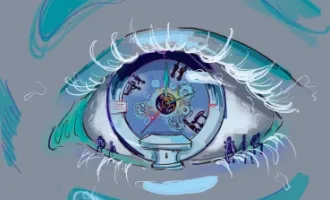
Determined
Editor's note: Victoria Turner's "Determined" is the first place winner of the Synapse Storytelling Contest's creative prose category.
I was fairly certain we each had a brain, when I entered college. I had not seen any firsthand, but I believed others had investigated the matter with care. Neurons were nestled tightly by the billions inside the skull. Each resembled a tadpole sprouting an impossibly long tail. I registered for a neuroscience course my first semester, and of course, my peri-adolescent mind suctioned onto certain questions. On diagrams of cortex, the labelled segments received sensation from toes, eyes, fingers. But where were genitalia? (Answer: Nestled in the crease at the top of the brain.) And what happened in the brain during orgasm? (Answer: Very unclear, somehow research funds end up elsewhere.)
During the course, I learned that thought is not a product of quiet turbines whirring inside the brain. It’s much weirder. Thought is the result of teeming chemicals and molecules that swarm between neurons and pop from tiny membranous balloons released into the gaps. Thought is a fiesta, a revolution, a jubilee of firecracker cells erupting into the dark.
-
Around this time, my father was diagnosed with borderline personality disorder. My first reaction was not knowing which was more insulting, being told something is wrong with your personality or being told your problem is merely borderline. Of course, that’s not what the term actually means. In the most bizarre but apt description I’ve read, patients with BPD are described as “hemorrhaging emotion.” Their moods cascade in waves, constantly changing; they are anxious, needy. Their normal thought is not my normal.
That three-letter designation recentered my perception of my father. He slid from frustrating to clinically damaged. There was no intermediate placement I could find for him in this new arrangement. It reminds me of an observation in neuroscience, something called the all-or-none principle. Either a neuron’s voltage shoots up above a certain threshold and it fires, or it does not. There is no half firing. The neuron has a transcendent electrical experience or it does not. My father’s mental diagnosis, or my interpretation of it, seemed to follow another all-or-none principle, this one marking the threshold between a healthy and an ill person. Worse, the diagnosis seeped back in time and refitted my memories of him like dye tracing back along the filament of a neuron. Everything before the illness was reclassified; each tension became another protruding angle of illness.
I didn’t have to stretch to find symptoms. My father’s career path exemplified the recklessness and instability attendant to BPD. Charitably speaking, he was a jack-of-all-trades– real estate agent, talent agent, computer staff, EMT, apartment manager, and so on. He loitered in pawn shops and dove dumpsters. He tried to complete nursing school twice and was kicked out each time. He threw things like telephones.
But for all the upheaval, my high school friends adored him. In good moods, my father was generous and charming. He roamed the house wearing inside-out tshirts and dirty hiking boots, cheerfully burning the soup or tacking up another set of antlers on the wall.
I realized my father’s charisma and endless stories might make a best-selling autobiography except for one thing. People who are still floundering do not write autobiographies. People who have been unemployed for four years without finding a way out cannot expect others to value their reflections. Transformation of sob story to struggle story depends entirely on the ending, becausestoryrelies on another all-or-none: whether you can say you’ve learned something in the reading. In my boiled-down reality, there was no middle ground. A person can be a survivor, past the nadir, or not.
Over the next months, I grouched. My friends tried to lighten my judgment. They told me my father must be trying hard, the economy wasn’t great, and he was myfather. I only grew harsher, because I had withheld from how invested I was in the outcome.
My father and I were more similar than I wanted to admit. My interests rattled off like his job history – neuroscience, physics, fiction, typography, industrial design. Other similarities I drew (our anxieties, erratic moods) could bring me that much closer to threshold. That gentle nudge from sane to ill.
I found myself up late prowling online medical databases for information on BPD. I sifted through abstracts. I read that in addition to hypersensitivity, BPD patients show decreased physical pain in laboratory experiments. I thought briefly, Dad is a superhero. I lost myself in the physicality of anatomy, listing brain areas showing altered activity in people diagnosed with BPD.
Anterior cingulate, insula, posterior cingulate, amygdala.
-
Imagine a conversation between the neuroscientist and the non-scientist:
“Do you fear being flesh? Why this need for magic?”
“I don’t fear being a brain. I just can’t believe that’s all I am.”
“But there’s no evidence of anything but electricity. Chemistry. Molecules bulging and shrinking, spinning and ionizing. Nothing else up there.”
“Well. Maybe I do fear. I fear for my consciousness being played by a lump of fat and blood. At least while I’m alive, I want to be more. Otherwise, what’s the point?”
“The point is what you make of it. Reality doesn’t come with an interpretation. Thoughts from brains are still thoughts. What meaning do you make from them?”
-
I must confess, something in me does fear determinism. Francis Crick, co-discoverer of DNA, hypothesized that consciousness was vested in the claustrum. I’ve seen the white stripes of claustrums, in sliced brains. They are unremarkable looking. Though neuroscientists no longer think consciousness can be localized so easily, they do think the phenomenon belongs to the domain of cells and molecules. A part of me shrinks from this possibility, but when I find myself doing a nervous dance atop the Cartesian divide, I stop and realign. I quiet the fear, enough so that I can go on. Fear alone has never been a problem. Fear forestalling life is the problem.
-
The most vivid way to imagine your own organ of thought is to hold another person’s.The two grayish halves are swollen, ridged with curling lines of tissue like something left in dishwater for too long. The olfactory bulbs, which innervate your nose and give you a sense of smell, dangle indelicately from the brain like tiny, half-developed arms.
The brain in your hands is heavy with implication. It once held someone’s personality and aspirations, their misgivings and the lies they told themselves. It might even carry remnants. A clear liquid leaks onto your gloves like the juice from a huge, dripping peach. You know the liquid is formaldehyde, but it’s as if the brain’s former thoughts are dripping into your palm.
I imagine holding my father’s brain, hefting its slippery weight in my hands. Ifirregular chemical and physical processes are at fault, at the junctures where one neuron taps the next on the shoulder, his responsibility is limited. I can forgive him. I might even love him again. But I cannot hope for him to simply change, to change his mind and his life.
Luckily, my father’s brain is still in his head. Plasticity,a little neuroscientist on my shoulder whispers helpfully. Determinism helps me forgive my father, gives him amnesty for the past, but the future is unknown. Until the day we die, we are still capable of flipping all of the tiles in a cosmic game of reversi. We can flip success to failure, failure to success, until the game is done.
-
My mother called me one day, after the divorce, to tell me that my father was moving to the Philippines. The day of departure arrived, but a message came from home, saying that my father hadn’t made it off the ground. As the flight attendants began to shut the door, he had panicked and demanded to be let off.
The second time he tried to fly, I read an email from my father. He had drugged himself with anti-anxiety medications. He had boarded and suffered another anxiety attack. They removed him from the plane.
The little neuroscientist whispered that my father’s brain was different from mine. Anterior cingulate, amygdala, insula,the little figure said, jabbing for emphasis. I wanted to blame my father for not trying hard enough, but how could I know what was enough – what is determined for us, and what we determine for ourselves.
We imagine that determinism can corrode responsibility. Eminent philosophers and scientists have argued about determinism for centuries, so simplifying the debate to its instinctual summary is misleading. But the fear remains. We might be teased from our free will.
A few months later marked my father’s third attempt to fly. It was almost a calendar event now, regular as a period. “Dad came back again,” read the entire message from my mother that evening. Synaptic dysregulation, whispered my little neuroscientist.
What determinism did for me that day was redeem my father for his shortcomings.On that day, I did not hope for him to change, not really. But the next day, I would.



